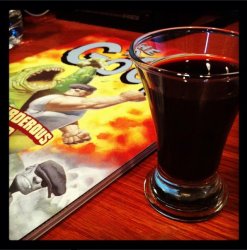If that's true then there is a big misconception about espresso around. Everyone I talk to seems to think one gets more caffeine from espresso than coffee, including me.

I second that. My mother still brews and I have my regular shock when visiting her.
Nobody asked, but I have a few minutes so I thought I would discuss, in my usually pedantic and annoying way, why espresso provides less of a caffeine jolt.
There are two types of coffee beans...Arabica and Robusta.
Arabica has about 1.5% caffeine by weight. Robusta has about 2.4-2.8% caffeine by weight.
From here on I'm going to make a lot of generalizations, so they can certainly be challenged.
Good espresso is made with Arabica beans. If not 100% Arabica, 85-90%...the Robusta is added mainly to increase the crema production. Inexpensive coffee, often used for drip, is mostly, if not totally, Robusta. So one major factor in caffeine content is the beans, and more often than not, espresso would have less caffeine than brewed because of the beans.
Espresso is generally made with dark to very dark roast beans, where brewed coffee blends tend to be lighter roast. In the roasting process, caffeine is "burned off"...some chemical/physical change that I don't understand. The darker the roast, the more of the caffeine burned off.
The extraction time with brewed coffee is much longer than with espresso. While granting that espresso is extracted under very high pressure and pulls the goodies in the coffee grinds very efficiently, the process takes 20-30 seconds. Brewed coffee is exposed to the water (which is extracting the coffee goodies) four about 4 MINUTES...pulling a lot of caffeine out.
Brewed coffee is generally a serving size of about 6-8 ounces, while espresso serving size is 2 - 2 1/2 ounces.
So, if brewed coffee is made primarily with Robusta (twice the caffeine), less darkly roasted (less caffeine burned off), with a longer extraction time, and in larger quantities per serving, you are getting more caffeine in brewed coffee.
A study was done to determine how much caffeine per ml of coffee there is. The study used the SAME BEANS and the IDENTICAL ROAST for both types of coffee (not usually the way things are in real life). When the coffee/espresso made from the SAME BEANS/SAME ROAST was analyzed, it was found the espresso had a little more caffeine than brewed coffee per ml.
I know that this contracts, to some extent, what I wrote above. But there are a few catches that make the study difficult from which to generalize:
The same beans were used for both productions. This is unusual in the real world because good espresso is not made with the kind of beans generally used in brewed coffee. Also the roast of the beans used in the real world is usually different, too. But even in this not-so-real-world experiment, the authors point out that even if espresso has a small amount more of caffeine per ml, the serving size difference still menas that you are getting less caffeine per serving of coffee.
Now, aren't you glad you didn't ask why espresso gives you less of a jolt than brewed coffee?
I definitely have too much time on my hands in the evening!!





